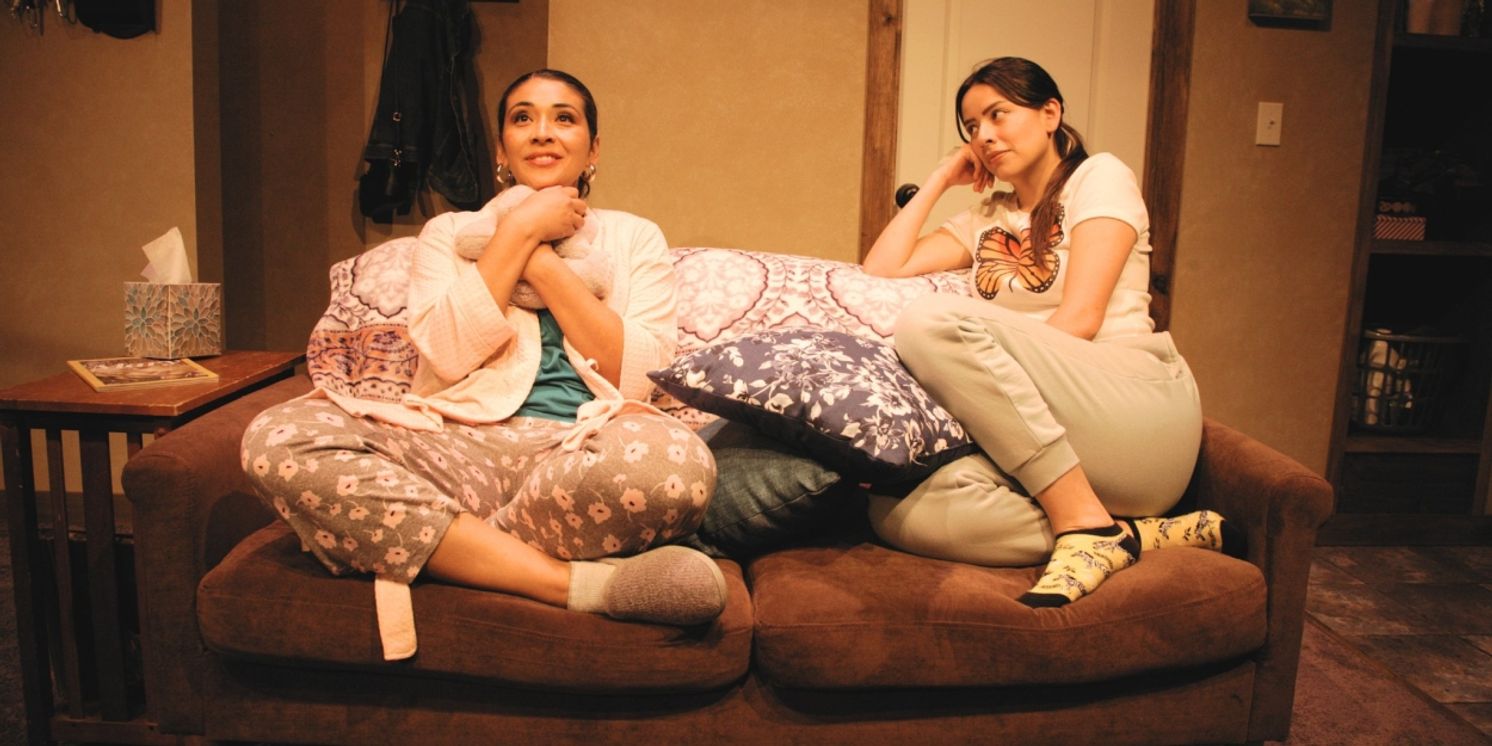Review: Chance Theater Stages OC Premiere of ALMA
A touching one-act drama from Benjamin Benne, the play focuses on the relatable struggles of an undocumented single mother raising an American-born teenager.

Currently continuing its extended Orange County premiere production at Chance Theater's very intimate Fyda-Mar Stage in Anaheim, CA through May 31, ALMA—the touching, poignant, and very timely play written by Benjamin Benne—delves dramatically into the complex, achingly relatable relationship between a struggling single mother and her smart but stubborn teenage daughter.
This absorbing, impressively acted one-act play—helmed with palpable tender care by director Sara Guerrero—is set over the course of a single, conversationally-tumultuous night that explores a specific (but, perhaps, very familiar) immigrant experience through themes of politics, identity, and the ever-widening generational clash of ideals and expectations under the overarching umbrella of the so-called "American Dream" that so many yearn to achieve, regardless of national origin or economic status.
Staged in a small, modestly-appointed, and very cramped lived-in apartment set—evoking a convincing realism thanks to the work of scenic designer Christopher Scott Murillo and lighting designer Kara Ramlow—the play's sole two characters (and the superb pair of actors that portray them respectively) can't really hide their every nuance or raw emotion from its audience, many of whom are sitting literally inches from them.
This, of course, provides a very close proximity to the searing drama that unfolds in real time, creating an intense and immersive environment that moves and stirs every person who bears witness.
The play focuses on low-wage restaurant worker Alma (beautifully portrayed by Marta Portillo), a hard-working undocumented immigrant from Mexico who is resolutely raising her American-born daughter, Angel (impressively played by Heather Lee Echeverria) in a tiny one-bedroom apartment in La Puente, California. From the onset, it is clear that Alma has sacrificed much to provide a better life for Angel—despite her daughter's seeming apathy for it—and is unyieldingly determined to see her daughter succeed in achieving the American Dream, or, at the very least, achieve much, much more than she knows she will ever reach.

Photo by Doug Catiller.
This unsurprising tug-of-war between the aspirations of first generation immigrants and the realities faced by their American-born children is, of course, at the heart of the play.
Chief among Alma's many aspirations for Angel, at least for the moment, is that her daughter scores high enough in the SAT's to be able to get into a local university (mainly UC Davis), thereby securing a brighter future filled with many more opportunities—and, in a roundabout way, to justify Alma's choice to risk coming to America illegally in the first place.
However, as the play gets underway, it becomes clear that Angel—not that atypical of a socially-connected, hyper-aware young person—is struggling under the weight of these nagging expectations. For the most part, Angel is caught between her mother's dreams for her future and her own selfish (but still valid) desires, which include a need to explore her own individuality, do typical activities of her age, and navigate the social and political realities of being a young Latina in contemporary, 21st Century America without the extra watchful eye of her mother.
This conflict, I can attest from personal experience, is definitely representative of the internal battles that a lot of children of immigrant parents that transcend cultural background must deal with: the act of gingerly navigating the duality of being a member of a culture while simultaneously trying to assimilate within one's current mixed "American" environment without causing animosity with either side.
Context clues (and the play's printed program) eventually hint that the play occurs sometime in early December of 2016, just after the election of a certain spray-tanned President-elect who isn't exactly fond of immigrants—legal or otherwise—which, of course, adds an extra element of existential dread amongst our characters. For them, a simple unexpected knock on their front door is always a cause for alarm.
On the night in question, tensions escalate as Alma discovers that Angel has not been entirely truthful about her promised diligence, her academic performance, and her plans for the future. This revelation leads to a heated and emotionally-fraught debate between mother and daughter, forcing them to confront their personal hopes and fears, and learn the true depth of the mutual sacrifices they both have made for each other.
Admittedly these melodramatic scenes are riveting to watch in a very feisty, daytime talk show-type of sparring sense, but the two impressive actors are so convincingly real in their back-and-forth that seamlessly ease from love and care to animosity—sometimes within the same sentence—that it's often hard to take your eyes off of their every move.
Throughout their intense dialogue exchanges—with Portillo and Echeverria displaying incredible performances throughout—the play explores the impact of immigration status, cultural identity, and the generational divide on their mother-daughter dynamics with intriguing attention. Alma's understandable fear of deportation and her unyielding determination for Angel's success understandably clashes with Angel's yearning for personal autonomy and her own sense of self, making it very hard for the audience to take sides.
Portillo's endearingly sincere Alma doesn't necessarily come off as simply an overbearing, demanding mother. She is unabashedly loving and has only great intentions as one might expect. Meanwhile, Echeverria's Angel goes through a palpable character arc that is central to the narrative, depicting a young woman on the cusp of adulthood, struggling to reconcile what her mother wants and what she wants. Her journey is one of self-discovery and empowerment, as she learns to assert her own identity which Alma can't really deny either.
Along the way, the pair reminisce about their pasts, share some laughs and re-heated Mexican takeout, marvel at the majesty displayed on animal-themed documentaries (we soon learn that Angel has aspirations to become a vet which her mom champions), and then be baffled by a haunted living room TV that seems to have a mind of its own.
By the end of the play, both Alma and Angel come to a deeper understanding of each other despite their opposing outsize opinions, recognizing the love and sacrifice that underpin their relationship, even as they grapple with the harsh realities of their lives. In the span of an intermission-less 90 minutes, ALMA unravels itself as a powerful exploration of the immigrant experience and the enduring strength of familial bonds amidst adversity. Through its pair of richly drawn characters and emotive dialogue, the play invites audiences to empathize with the struggles and aspirations of its protagonists.
As I walked out of the theater, I was reminded about my own immigrant mother, and the dreams and aspirations she must have had with her two children. I am fortunate that both my parents eventually supported my future life choices—even if she still lets loose a few passive-aggressive comments about what I should have done with my life every so often (but don't all parents do that… no? Just mine?)
But what really struck me with the play is how much it makes me wish that people who are quick to judge those who choose to try to come to America to better their lives should watch this play to get a sense of what it really fees like to live in their shoes… to see how the other half lives… in the hopes that it could, perhaps, open some minds and open some hearts.

Photo by Doug Catiller.
ALMA is not simply just a truncated story of an immigrant mother and her daughter. It is, at its core, a universal, very relatable tale of love, sacrifice, and the enduring quest to strive for a better life. Overall, the play is a deeply moving exploration of familial bonds, cultural identity, and the challenges faced by hopeful, aspirational immigrants in contemporary America, making it a compelling and thought-provoking play that resonates on multiple levels—especially the human one.
Follow this reviewer on TwitterX / Instagram / Threads: @cre8iveMLQ.
Photos from Chance Theater's production of ALMA by Doug Catiller.
-------
Chance Theater's Production of Benjamin Benne's ALMA—directed by Sara Guerrero—continues its extended run on the Fyda-Mar Stage through May 31, 2024.
Chance Theater is located in the Bette Aitken Theater Arts Center at 5522 E. La Palma Ave., Anaheim, CA 92807. For more information or to purchase tickets, call (714) 777-3033 or visit www.ChanceTheater.com.
***
Reader Reviews
Videos

